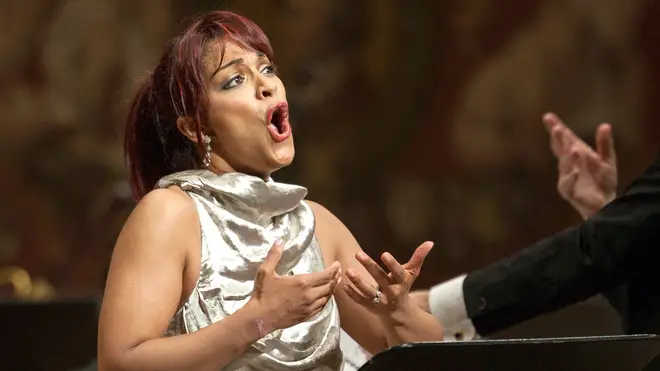On Air Now
Classic FM Breakfast with Tim Lihoreau 7am - 9am
5 July 2021, 12:11 | Updated: 5 July 2021, 12:17

The lyric soprano has spoken about the pain of miscarrying a child, and the crucial support she received from the London opera house.
Danielle de Niese has spoken openly about having a miscarriage hours before the opening night of Puccini’s La bohème at the Royal Opera House. Her performance as Musetta was hailed by critics the next day as “show-stealing”.
Speaking to raise awareness of the pain women and families go through every day, the Australian-American lyric soprano said that just 18 hours before her cue to be on stage, she was in agony from the miscarriage, and continued to have cramps for days afterwards.
Despite her pain De Niese, who is married to Gus Christie and lives at the opera house Glyndebourne in East Sussex, had been absolutely determined to go ahead with the premiere.
“Even though I thought I was having a miscarriage, when Gus and I heard that I was pregnant there was no time to come to grips with it,” she told The Guardian. The couple then travelled home. “I was thinking: ‘I’ve had a miscarriage; this will probably come out in a few hours, and I’ll then rest for the performance.’
“If I heard myself from the outside, I’d think: ‘Wow, why are you thinking about that, of all things?’ But it wasn’t that I was prioritising my performance over what I was going through; there was a part of me that really desired seeing my premiere through.”
Read more: Danielle de Niese: People tell me ‘you don’t look like an opera singer’

The mother-of-two, who seven months ago gave birth to her baby daughter Sheherazade Christie, did not know she was pregnant until she went to see her doctor about the cramps she was experiencing.
“I was in more pain than I could manage to hide from my children,” said De Niese, who also has a five-year-old son, Bacchus.
De Niese said she called the Royal Opera House, who were deeply supportive of whatever she decided to do. “If I wanted to pull out, they reassured me they had contingency plans in place, but they didn’t make me. It’s conceivable that a theatre house could have thought about their own risk assessment and encouraged me not to go on.
“I felt so loved in that moment because as a theatre person you want to perform. I suppose, if they had told me not to perform, I may have felt sidelined and even like I was being penalised for talking about it,” she said.
De Niese then spoke to her medic and decided to go ahead with the performance with some specific advice for the night, which she gave to her dresser. After Act Two, De Niese said her husband came backstage. “I asked him: ‘How was that? It was like an out-of-body experience for me,’ and he told me it was amazing.”
Singing the top notes, De Niese said she felt a strain on her groin muscles, and rather than jumping off stage at the end, she was given a hand to step down. All the while, the audience was unaware of what she was going through.

La bohème – Musetta's Waltz AKA 'Quando m'en vo' (Danielle de Niese; The Royal Opera)
Two days later, it was confirmed to De Niese that her pregnancy had been ectopic, which is when a fertilised egg implants itself outside of the womb. Ectopic pregnancies count for one in 90 pregnancies in the UK.
Oliver Mears, director of opera at the Royal Opera House, said: “We were incredibly sorry to hear of Danni and Gus’ experience, and have enormous sympathy for all that Danni has been through. At ROH, each artist has a cover for their role for any eventuality; on this occasion, Danni was offered cover but decided after medical advice to go on stage.
“We discussed at length and respected Danni’s decision to perform. We are proud of the support we provide all staff and artists – and proud also of Danni as an artist who gives her full self both on and off-stage: whether giving a magnificent performance in La Bohème in hugely difficult circumstances or highlighting issues that matter to women everywhere. We wish Danni, Gus and the family all our best.”
De Niese told her story to The Guardian, to raise awareness of how many people experience miscarriages. “I’ve been through a major ordeal and am grateful I managed to triumph professionally, regardless of what was happening personally and physically with me, especially at this time when people are so thirsty for live music and live theatre after pandemic lockdowns,” she told the publication.
“I was fortunate to have the amazing support of ROH. But this is something that women face every day and that determination and desire to continue, for ourselves and for others, is there within, despite female experiences from fertility treatment to miscarriage happening in the workplace.”